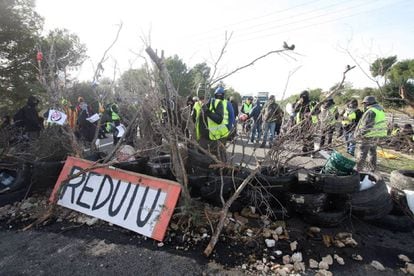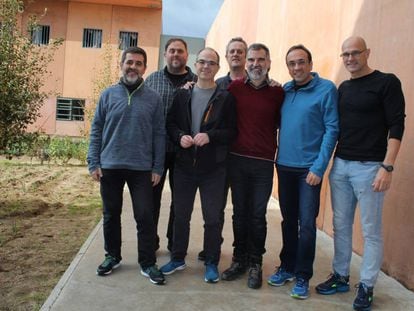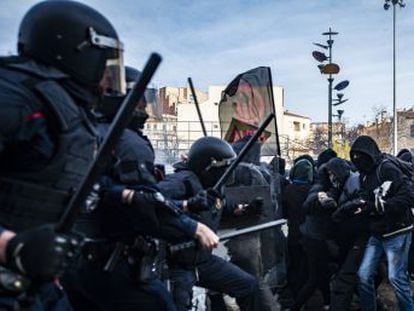Catalan pro-independence activists block highway for 15 hours
The grassroots group also tampered with toll barriers to demand separatist leaders in pre-trial detention be released from prison
Grassroots pro-independence groups calling themselves the Committees to Defend the Republic (CDR) blocked a highway and tampered with toll plazas in Catalonia this weekend, coinciding with a national holiday that saw increased traffic volume on Spain’s roads.
The activists were allowed to conduct their protest actions without any interference from the regional police force, the Mossos d’Esquadra. The protesters staged the action to call for the release of Catalan independence leaders in pre-trial detention for their involvement in the separatist push.

On Saturday, CDR groups blocked the AP-7 highway in Tarragona for 15 hours. In Barcelona, a group of 250 people marched down a main avenue, blocking traffic in both directions. On Sunday they raised the barriers at toll plazas in L’Hospitalet de l’Infant, Martorell, Girona, Vallvidrera and Manresa for three hours, letting vehicles through for free.
An estimated 250,000 vehicles used Catalan roads on Sunday, when people returned home after a long weekend marked by the Constitution Day and Immaculate Conception national holidays, on December 6 and 8, respectively.
Slovenian model
Meanwhile, there has been strong reaction to Catalan premier Quim Torra’s defense of a “Slovenian model” for Catalonia. Following his visit to Slovenia last week to meet with political and social leaders, Torra was in Brussels last Saturday to join former premier Carles Puigdemont at an event to present the Council of the Republic, an unofficial body sponsored by Catalan separatist politicians.
There, Torra held up Slovenia as a model to follow. “We Catalans have lost our fear. There is no going back on the road to freedom. Slovenians decided to forge ahead no matter what the consequences. Let us be like them, and let us be ready for everything in order to live free,” said Torra.
It is the kind of language that seems to be calling for an insurrection
Foreign Minister Josep Borrell
Political leaders of all stripes have warned that this sounds like a defense of violence, noting that there was a 10-day war and dozens of casualties prior to Slovenia’s secession from Yugoslavia.
“It is the kind of language that seems to be calling for an insurrection,” said Spanish Foreign Minister Josep Borrell on Monday in Brussels, where he arrived for a summit of EU ministers. “It’s not the first time they have resorted to this kind of thing. Inside the Catalan parliament they’ve proposed the Kosovo model, and [Catalan Republican Left leader] Oriol Junqueras has repeatedly recommended the ‘Irish way,’ which resulted in a tremendous civil war.”
Barcelona Mayor Ada Colau, of the leftist Barcelona en Comú, called Torra’s statements “hugely irresponsible” and a “smokescreen” to conceal his government’s own problems. Colau asked him “to rectify immediately.”
“The mere mention of Slovenia as a solution to the problem at hand is a mistake, complete foolishness and tremendous folly,” tweeted Miquel Iceta, leader of the Catalan Socialists (PSC).
Inés Arrimadas, head of the center-right Ciudadanos party in the region, said that Torra is a “public hazard” for appealing to the Slovenian model, and Alejandro Fernández, leader of the Catalan branch of the Popular Party (PP), said that “separatists want the Balkanization of Spain.”
Role of Mossos
Torra has met with his chief of internal affairs Miquel Buch to discuss the events of December 6, when the Mossos clashed with far-left counter-protesters who were trying to break up a tribute to the Spanish Constitution in Girona that was attended by members of the far-right Vox party. Torra publicly criticized the police’s actions and demanded corrective measures, and pro-independence parties criticized the Mossos for “assaulting anti-fascists.”
Mossos chief Andreu Martínez has defended the police charges, and former Catalan premier Artur Mas, under whose mandate Catalonia held a non-binding ballot on independence in 2014, said on Saturday that “police criteria, not political criteria,” should be used in the management of the regional police force. The role of the Mossos has been the subject of tense debate ever since October 1, 2017, when they were accused by Spanish authorities of standing by while an unauthorized independence referendum was being held.
English version by Susana Urra.













































